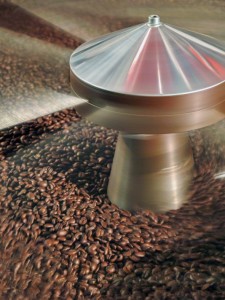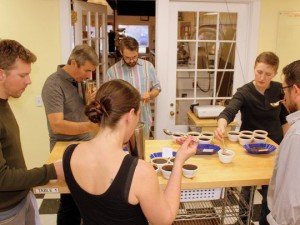
(Photo: Courtesy Vermont Artisan Coffee & Tea)
Coffee drinkers are growing up. So is their beverage of choice.
Baby boomers and seniors are the biggest coffee consumers in the United States, according to the National Coffee Association.
An increasing number of Vermont companies are hoping that baby boomers’ desire for locavore products will lead them to purchase coffee that is roasted close to home. They import their beans from a variety of sources and provide high-end coffee for those who have cultivated a taste for their caffeinated beverage of choice.
As is the case with craft beers and craft spirits, Vermonters are showing an affinity for locally roasted, small batch coffees. For some, the country of origin is the most important selling point. Others search for esoteric flavoring or the recognition that the coffee beans are Fair Trade or organic..
Mané Alves of Vermont Artisan Coffee and Tea in Waterbury said while some people drink coffee only for the caffeine, many others are developing a more sophisticated palate for the beverage.
“The previous generations may not have cared that much,” he said, “but I think that has evolved. We’re not at the wine model yet, but we’re moving toward it. … In a restaurant, you’re likely to ask for a cabernet or pinot, rather than just a red wine. People are starting to order coffee based on the varietal or country of origin.”
Vermont Artisan Coffee and Tea is among a growing number of Vermont companies dedicated to coffee roasting, some of which are doing very inventive things like infusing cold coffee with nitrogen or using coffee for meat rubs.
Alves, a native of Portugal, worked in the wine industry in California, but moved into the world of coffee when he followed his future wife to Vermont. Sensing a void in the field of coffee education, he said, he founded Coffee Lab International in 1995.
“I was lucky because I came from wine country and had the sensory background which could be applied to the coffee industry,” Alves said. “At that time, there was no place people could go to learn, but these days, the Specialty Coffee Association of America and other organizations in Europe have established a curriculum where we can teach about brewing, cupping, roasting, and being a barista. It’s almost like professional development classes.”
Alves is putting the finishing touches on a new building, which is tentatively scheduled to open in early January. It will include a larger space for teaching and a coffee bar. It will be the first fully certified facility on the East Coast.
“We only roast coffee when we have an order, so people have to order ahead,” he said. “This way, I can sell by the cup.”
The cupping and tasting classes Alves will offer will follow the curriculum of the nonprofit Coffee Quality Institute, while the roasting classes will be of his own design.
Alves has developed a new product line, Caff-Draft; a nitrogen-infused cold coffee. The product is poured from a tap and resembles a dark ale, but tastes like coffee.
“It’s very refreshing,” he said “and we’ll have different types that we’ll put on the market seasonally.”
The new café will have two or three different spigots for Caff-Draft. Additionally, Alves is planning some mixed coffee drinks using local brewed alcohol.
Customer loyalty matters
Like Alves, Sandy Riggen came to the world of coffee via a circuitous route. A former caterer and private chef, Riggen bought Brown and Jenkins Coffee 10 years ago with her husband, Rich Williams. The company is one of the state’s older coffee roasters, dating back to 1984.

Riggen said baby boomers continue to favor percolated coffee over more modern single-serve options. The majority of her sales are online, with a subscription business of nearly 2,000 people. The company also has commercial and personal accounts and sells its coffee at the Vermont Maple Outlet on Route 15.
“Our demographic is over 50, well-traveled, well-educated and worldly,” Riggen said. “I know a lot about my customers and they tend to be more loyal than millennials.”
Baby boomers are interested in learning more about what they drink, Riggen said, so she has begun providing more background material about her coffee on the company’s website.
Brown and Jenkins has 72 different types of coffee, including 14 single origin beans, a designation which indicates that all the beans come from the same location.
Riggen said coffee can be used in a variety of foods and she offers coffee rubs as part of her product line. It was only after she had purchased the company that she learned one of the secret ingredients in her grandmother’s signature gravy was coffee.
Boomers want better coffee
A relative newcomer to the field of gourmet coffee is Tony Basiliere, the 63-year-old owner of Earthback Coffee Roasters in South Burlington. Basiliere said he thinks baby boomers are drinking less coffee than they did in their youth, but are gravitating to better coffee.
“They are enjoying coffee more for its flavor attributes,” he said, noting that young people are following suit. “Being into coffee as a young person is a hip thing, which I think is fantastic.”
Earthback Coffee can be purchased online and at locations in Washington and Chittenden counties. It is the exclusive coffee served at Tight Squeeze in Burlington.
Baby boomers and their millennial counterparts are part of what is known as the third wave of coffee, Basiliere said, a movement which considers coffee to be an artisanal product similar to wine rather than being treated as a commodity.
But Basiliere said he thinks, in some cases, that wave is being pushed a bit too far by those who make coffee overly light in order to accentuate the flavor characteristics, but lose body as a result.
Basiliere has been in business since 2011 and his beans are certified by the Rainforest Alliance, Fair Trade or USDA Organic. He said baby boomers are particularly interested in the organic label for health reasons.
“We’ve beaten ourselves up and we want to take better care of ourselves now,” he said, “but the reality is that specialty grade coffees, even those without an organic certification, don’t have anything bad in them.”
The name Earthback comes from Basiliere’s commitment to a healthy ecosystem.
“My philosophy in business,” he said “is awareness of the environment, constantly seeking ways to lessen the impact or footprint.”
Basiliere makes his deliveries with recycled banana boxes and only a tiny percentage of the company’s waste goes to a landfill. He recently purchased a Loring coffee roaster which he described as the most energy efficient on the market, using one-fourth the energy of a conventional roaster with no emissions.
After years of medical warnings about the effects of coffee, Riggen said she is pleased that current studies show that there are benefits to drinking it.
“Coffee is universal,” she said. “It connects the world.”
Check them out
Vermont Artisan Coffee & Tea Company
80 Commercial Drive, Waterbury, 802-244-8338,
vtartisan.com
Brown & Jenkins
P.O. Box 280, Jeffersonville, 802-644-8300,
brownjenkins.com
Earthback Coffee Roasters
11 Simpson Court, South Burlington, 802-489-5555,
earthbackcoffeeroasters.com
source: http://www.burlingtonfreepress.com / Burlington Free Press / by Phyl Newbeck, Free Press Correspondent / December 19th, 2016

